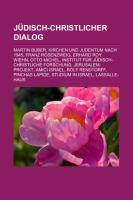Jüdisch-Christlicher Dialog
BücherAngebote / Angebote:
Quelle: Wikipedia. Seiten: 139. Nicht dargestellt. Kapitel: Martin Buber, Kirchen Und Judentum Nach 1945, Franz Rosenzweig, Erhard Roy Wiehn, Otto Michel, Institut Für Jüdisch-Christliche Forschung, Jerusalem-Projekt, Amici Israel, Rolf Rendtorff, Pinchas Lapide, Studium in Israel, Lassalle-Haus, Schalom Ben-Chorin, Henry Brandt, Wer War Schuld an Jesu Tod?, Nea Weissberg-Bob, Hans Hermann Henrix, Robert Raphael Geis, Michael Brocke, Buber-Rosenzweig-Medaille, Lilli Marx, Edna Brocke, Romuald Jakub Weksler-Waszkinel, Deutscher Koordinierungsrat Der Gesellschaften Für Christlich-Jüdische Zusammenarbeit, Ruth Lapide, Internationaler Rat Der Christen Und Juden, Gesellschaft Für Christlich-Jüdische Zusammenarbeit in Frankfurt Am Main, Siegfried Von Kortzfleisch, Rolf Bloch, Jacobsonschule, Jonathan Magonet, Gesellschaft Für Christlich-Jüdische Zusammenarbeit Kassel. Auszug: Martin Buber (Hebrew: ¿, February 8, 1878 - June 13, 1965) was an Austrian-born Jewish philosopher best known for his philosophy of dialogue, a form of religious existentialism centered on the distinction between the I-Thou relationship and the I-It relationship. Born in Vienna, Buber came from a family of observant Jews, but broke with Jewish custom to pursue secular studies in philosophy. In 1902, Buber became the editor of the weekly Die Welt, the central organ of the Zionist movement, although he later withdrew from organizational work in Zionism. In 1923 Buber wrote his famous essay on existence, Ich und Du (later translated into English as I and Thou), and in 1925 he began translating the Hebrew Bible into the German language. In 1930 Buber became an honorary professor at the University of Frankfurt am Main, and resigned in protest from his professorship immediately after Adolf Hitler came to power in 1933. He then founded the Central Office for Jewish Adult Education, which became an increasingly important body as the German government forbade Jews to attend public education. In 1938, Buber left Germany and settled in Jerusalem, in the British Mandate for Palestine, receiving a professorship at Hebrew University and lecturing in anthropology and introductory sociology. Buber's wife Paula died in 1958, and he died at his home in the Talbiyeh neighborhood of Jerusalem on June 13, 1965. Martin (Hebrew name: ¿¿¿¿¿¿¿¿¿¿, Mordechai) Buber was born in Vienna to an Orthodox Jewish family. His grandfather, Solomon Buber, in whose house in Lemberg (now Lviv, Ukraine) Buber spent much of his childhood, was a renowned scholar of Midrash and Rabbinic Literature. At home Buber spoke Yiddish and German. In 1892, Buber returned to his father's house in Lemberg. A personal religious crisis led him to break with Jewish religious customs: he started reading Immanuel Kant, Søren Kierkegaard, and Friedrich Nietzsche. The latter two, in particular, inspired him to pursue studies i
Folgt in ca. 5 Arbeitstagen

